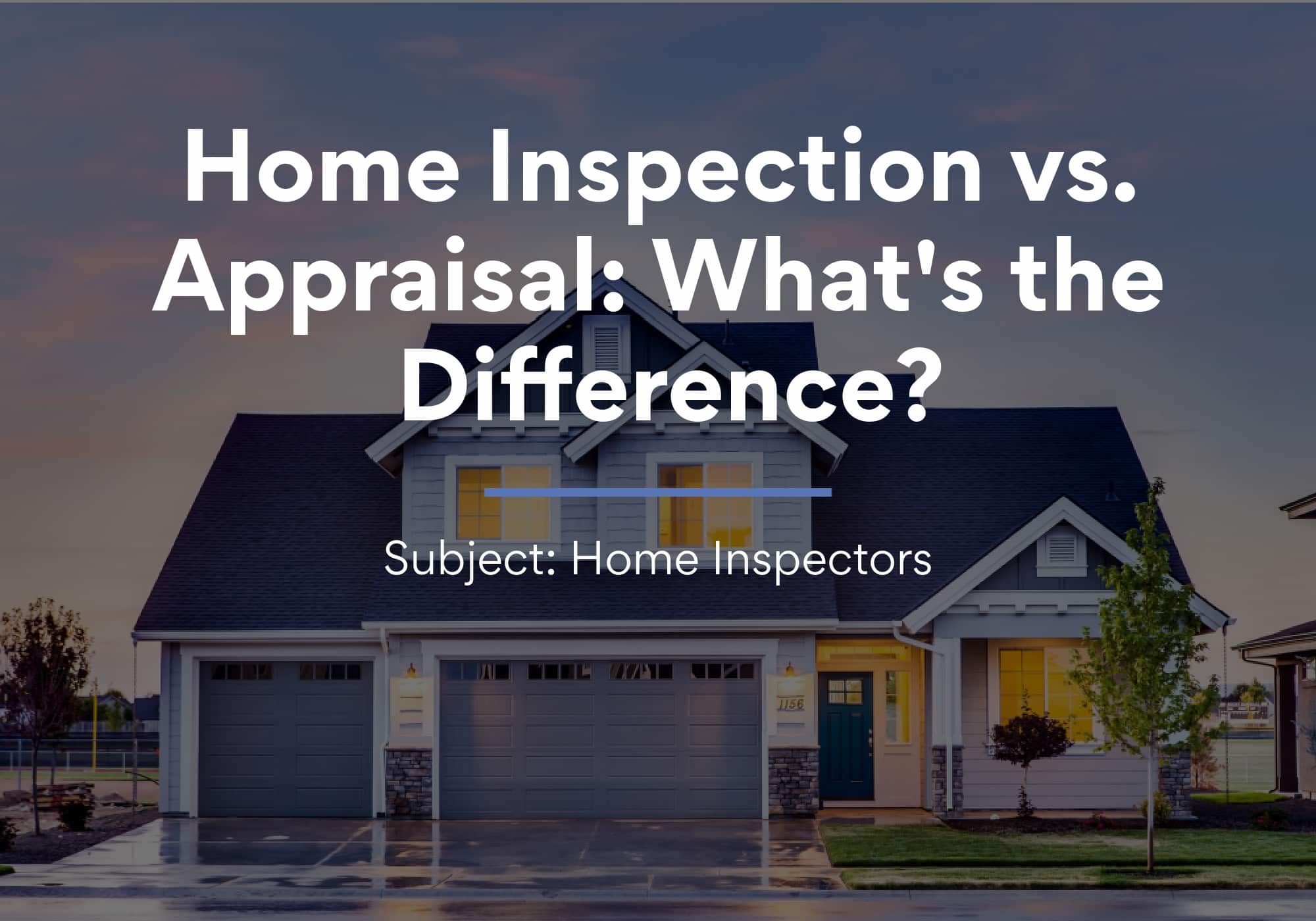Purchasing a new home can be confusing…especially if it’s your first time.
In this article, we’ll examine the differences between a home inspection vs appraisal.
Buying a home can be more than a little nerve-wracking, especially if it’s your first time.
Between getting approval from a mortgage lender to finding a trustworthy real estate agent, you’re likely filled with questions about the homebuying process: What is my loan amount? Does the home have enough square footage? What will my commute be like?
You may also find yourself wondering whether you should get a home inspection or an appraisal. Perhaps you don’t know the difference between the two.
There is a quite a large difference between a home inspection vs appraisal. In this article, we’ll explore why each one is important and how they fit into the real estate transaction process.
What Is a Home Inspection?
A home inspection is arguably one of the most important milestones in the real estate process.
During an inspection, a licensed home inspector examines as much of the home as possible to get an accurate idea of the current condition of the property.
A typical Buyer/Seller inspection looks and things such as the home’s structure, plumbing and electrical systems, roof, and appliances (such as the HVAC system, hot water heater, and kitchen appliances). It may include ancillary inspections such as mold, wood destroying organisms (termite), or pools.
Your home inspector will also look for anything that could be a potential issue in the future, such as a lawn that slopes toward the foundation or a roof that’s approaching the end of its life.
The end result is a detailed inspection report listing all of the known issues with the home. This report comes in handy to buyers, as they can negotiate the sale price based on any issues that were discovered. They can either inform the seller that they will not move forward with the sale unless a particular issue is fixed or ask that the seller lower the price so the issues can be fixed by a professional after closing.
While home buyers are not legally required to get an inspection, most do so because they don’t want to unknowingly purchase a home with major issues. However, if a buyer does opt for a home inspection, the seller is required to comply (i.e. allowing the inspector inside the home).
What Is a Home Appraisal?
A home appraisal is typically required by mortgage companies. Before they issue a large loan amount, they want to verify the home’s value. The last thing they want is to loan out more than the home is worth.
Therefore, an appraisal is a professional assessment of a home’s value. Several different methods are used to calculate a home’s value.
First, an appraisal considers the technical characteristics of your home, things like the number of bedrooms, the location, and square footage.
Once the baseline has been established, there will be an on-site visit to the home. Here, a licensed appraiser tours your home looking for “upward” and “downward” adjustments. For example, adding a deck or pool will increase the value of your home. Things like a broken water heater or a 15-year-old roof will decrease it.
The end result is a home appraisal report delivered to all stakeholders. This report is a critical milestone on the financing side of real estate.
Home Inspection vs Appraisal: Which One Do You Need?
When looking at a home inspection vs appraisal, there are some similarities. Both are professional examinations of a home completed by professionals for the purpose of completing a real estate transaction. Further, both can give you important data buyers can use when negotiating the sale price of their new home.
The difference lies in the experience, background, and knowledge of the professional person or company doing the work.
Home inspectors are well-versed in how well a home is constructed and how it will function day-to-day. Some (but not all) inspectors might even have a background in construction or engineering. Further, home inspectors can be useful throughout your time in a home, not just during the sale. Wind mitigation inspections and 4-point home inspections are common requests from homeowners looking to save money on their home insurance premiums.
Professional appraisers, on the other hand, are concerned with the value of your home, not the function of it (except where it would affect a home’s value). Appraisers are more likely to have a background in real estate or mortgage lending. Homeowners can choose to have their home appraised for insurance purposes (that is, not for a real estate transaction) so they can reexamine their coverage limits and other policy details.
Another difference between home inspectors and appraisers is that buyers may hire any home inspector they choose, while an appraiser is chosen for them.
Conclusion
At the end of the day, both the appraisal and inspection are crucial milestones in your home sale. The appraisal ensures that you pay market value, while an inspection identifies potential problems with the home.
When it comes to the home inspection vs appraisal showdown, there’s no standout winner. However, the longer you plan to stay in your home, the more important it is that you get a home inspection.
If you’re in love with a home (and plan to own it for many years), you’ll want to have as accurate a picture as possible of the home’s condition. After all, there’s no “Lemon Law” or return policies when it comes to real estate; once you close on a property, you are completely responsible for it.
Getting a thorough, accurate home inspection will give you the valuable information you need to buy your Dream Home with the utmost confidence.
Whether you’re looking for a “move-in ready” home or a fixer-upper, EDC Professional Home Inspections can help. Owned by Master Inspector Erik Coplin, our process is backed by a 100-day guarantee, so you have nothing to fear.
Contact us today to schedule your inspection.





